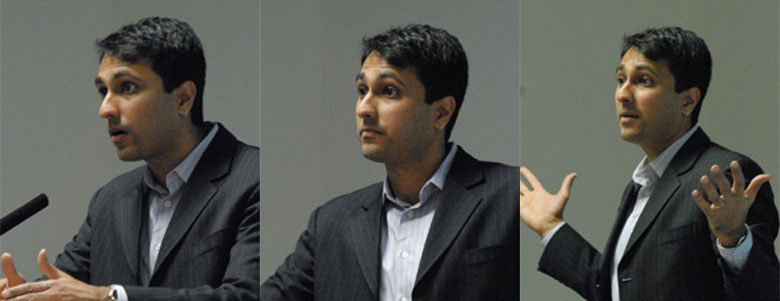Eboo Patel is the Founder and Executive Director of Interfaith Youth Core, an organisation that promotes mutual respect and pluralism among young people from different religious traditions. The 34-year-old Rhodes scholar also advises United States President Barack Obama, who appointed him a member of the White House Office of Faith-Based and Neighborhood Partnerships in February 2009.
TheIsmaili.org spoke with Patel to gain a better understanding of the work that he does and the vision that he espouses.
In the first of this two-part series (Part 2 is available here), Eboo Patel explains his motivations for working towards religious pluralism. Video excerpts of a talk that he delivered at The Institute of Ismaili Studies in December 2009 accompany the interview.
 Eboo Patel, founder and Executive Director of the Interfaith Youth Core, a Chicago-based institution building the global interfaith youth movement, addressing an audience at The Institute of Ismaili Studies in London on 14 December 2009. Courtesy of The Institute of Ismaili Studies
Eboo Patel, founder and Executive Director of the Interfaith Youth Core, a Chicago-based institution building the global interfaith youth movement, addressing an audience at The Institute of Ismaili Studies in London on 14 December 2009. Courtesy of The Institute of Ismaili StudiesPart 1: The shared value of religious pluralism
TheIsmaili: You frame your work in terms of a concept that you call “the faith line.” Tell us what this is all about.
Eboo Patel: One hundred years ago, the great African American scholar W.E.B. DuBois famously said that “the problem of the twentieth century will be the problem of the colour line.” Most people assumed that the colour line divided black and white. But Dr Martin Luther King Jr came around 60 years later and changed the paradigm. He suggested that the real dividing line wasn't between black and white, but between those who wanted to live together as brothers, and those who wanted to perish together as fools.
I believe the 21st century will be dominated by the question of the faith line.
Our first and most important challenge is to recognise that the faith line does not divide Muslims and Christians, Hindus and Buddhists or secularists from the faithful. The faith line separates religious totalitarians and religious pluralists.
Religious totalitarians want a society where their group dominates and everyone else suffocates. Religious pluralists want a society where people from different backgrounds live in equal dignity and mutual loyalty.
The pluralists are in the majority, and yet the totalitarians have succeeded in convincing us to be afraid of each other. The challenge of the faith line is for those of us in the majority to stand up for our pluralist vision, to tell our story, to put the extremists back in their place: on the extremes.
TheIsmaili: How do you define the notion of religious pluralism?
EP: Our definition of pluralism has three parts: respect for religious identity, relationships between diverse groups, and common action for the common good.
Respect for religious identity is the first component of religious pluralism, and is necessary to build meaningful relationships with people who have diverse beliefs. In part, this means finding the positive commonalities between traditions. These shared values serve as inspiration for those who do have differences in belief to come together and work towards bettering the world.
TheIsmaili: Why is it so important to foster religious pluralism at this particular time?
EP: There is no more important time to advance religious pluralism than now, in the 21st century.
In an era of global religious conflict, idealism has a new face: interfaith youth cooperation. The evening news features stories of young people killing each other to the soundtrack of prayer. Yet across the country and the world, young people of many faiths are coming together around the shared value of service. With the support of President Obama – as well as former Prime Minister Tony Blair – we have an unprecedented opportunity to make the dream of interfaith cooperation a reality.
In Cairo, Obama said: “Indeed, faith should bring us together. That is why we are forging service projects in America that bring together Christians, Muslims, and Jews... Around the world, we can turn dialogue into Interfaith service, so bridges between peoples lead to action – whether it is combating malaria in Africa, or providing relief after a natural disaster.”
Now more than ever, we have to capture this moment in history – and the support of these influential leaders – to promote religious pluralism.
TheIsmaili: How do you respond to critics who claim that religious pluralism undermines religious identity?
EP: In our work on the ground we have seen time and time again that religious pluralism does not undermine religious identity. In fact, it goes one step further, and tends to deepen religious identity.
When young people are exposed to other faith traditions, they become even more curious about discovering their own heritage. We have found that by observing their peer's commitments to a particular tradition or practice, young people are inspired to invest themselves even more deeply in their own tradition.
TheIsmaili: In your activities, you seek to inspire young people to action. Who inspires you? Can you pick out specific qualities that have significantly influenced you?
EP: Many of my personal heroes, like the Aga Khan, Mahatma Gandhi, Dorothy Day, and Thich Nah Han, were young people of faith who started movements for interfaith cooperation. Their courage, determination, and above all innovation, inspire me to this day in my own work.
In the second part of this interview, Eboo Patel discusses how the Interfaith Youth Core overcomes the faith line and promotes religious pluralism by bringing young people together to engage in dialogue and service to the community.






